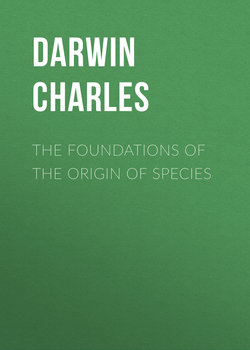Читать книгу The Foundations of the Origin of Species - Чарльз Дарвин, Darwin Charles - Страница 7
PART II 104
§ VII. «Affinities and Classification.»
ОглавлениеLooking now to the affinities of organisms, without relation to their distribution, and taking all fossil and recent, we see the degrees of relationship are of different degrees and arbitrary, – sub-genera, – genera, – sub-families, families, orders and classes and kingdoms. The kind of classification which everyone feels is most correct is called the natural system, but no can define this. If we say with Whewell «that we have an» undefined instinct of the importance of organs135, we have no means in lower animals of saying which is most important, and yet everyone feels that some one system alone deserves to be called natural. The true relationship of organisms is brought before one by considering relations of analogy, an otter-like animal amongst mammalia and an otter amongst marsupials. In such cases external resemblance and habit of life and the final end of whole organization very strong, yet no relation136. Naturalists cannot avoid these terms of relation and affinity though they use them metaphorically. If used in simple earnestness the natural system ought to be a genealogical «one»; and our knowledge of the points which are most easily affected in transmission are those which we least value in considering the natural system, and practically when we find they do vary we regard them of less value137. In classifying varieties the same language is used and the same kind of division: here also (in pine-apple)138 we talk of the natural classification, overlooking similarity of the fruits, because whole plant differs. The origin of sub-genera, genera, &c., &c., is not difficult on notion of genealogical succession, and accords with what we know of similar gradations of affinity in domesticated organisms. In the same region the organic beings are «illegible» related to each other and the external conditions in many physical respects are allied139 and their differences of same kind, and therefore when a new species has been selected and has obtained a place in the economy of nature, we may suppose that generally it will tend to extend its range during geographical changes, and thus, becoming isolated and exposed to new conditions, will slightly alter and its structure by selection become slightly remodified, thus we should get species of a sub-genus and genus, – as varieties of merino-sheep, – varieties of British and Indian cattle. Fresh species might go on forming and others become extinct and all might become extinct, and then we should have «an» extinct genus; a case formerly mentioned, of which numerous cases occur in Palæontology. But more often the same advantages which caused the new species to spread and become modified into several species would favour some of the species being preserved: and if two of the species, considerably different, each gave rise to group of new species, you would have two genera; the same thing will go on. We may look at case in other way, looking to future. According to mere chance every existing species may generate another, but if any species, A, in changing gets an advantage and that advantage (whatever it may be, intellect, &c., &c., or some particular structure or constitution) is inherited140, A will be the progenitor of several genera or even families in the hard struggle of nature. A will go on beating out other forms, it might come that A would people earth, – we may now not have one descendant on our globe of the one or several original creations141. External conditions air, earth, water being same142 on globe, and the communication not being perfect, organisms of widely different descent might become adapted to the same end and then we should have cases of analogy143, [they might even tend to become numerically representative]. From this often happening each of the great divisions of nature would have their representative eminently adapted to earth, to «air»144, to water, and to these in «illegible» and then these great divisions would show numerical relations in their classification.
135
After “organs” is inserted, apparently as an afterthought: – “no, and instance metamorphosis, afterwards explicable.”
136
For analogical resemblances see Origin, Ed. i. p. 427, vi. p. 582.
137
“Practically when naturalists are at work, they do not trouble themselves about the physiological value of the characters… If they find a character nearly uniform… they use it as one of high value,” Origin, Ed. i. p. 417, vi. p. 573.
138
“We are cautioned … not to class two varieties of the pine-apple together, merely because their fruit, though the most important part, happens to be nearly identical,” Origin, Ed. i. p. 423, vi. p. 579.
139
The whole of this passage is obscure, but the text is quite clear, except for one illegible word.
140
«The exact position of the following passage is uncertain:» “just as it is not likely every present breed of fancy birds and cattle will propagate, only some of the best.”
141
This suggests that the author was not far from the principle of divergence on which he afterwards laid so much stress. See Origin, Ed. i. p. 111, vi. p. 134, also Life and Letters, i. p. 84.
142
That is to say the same conditions occurring in different parts of the globe.
143
The position of the following is uncertain, “greyhound and racehorse have an analogy to each other.” The same comparison occurs in the Origin, Ed. i. p. 427, vi. p. 583.
144
Air is evidently intended; in the MS. water is written twice.
